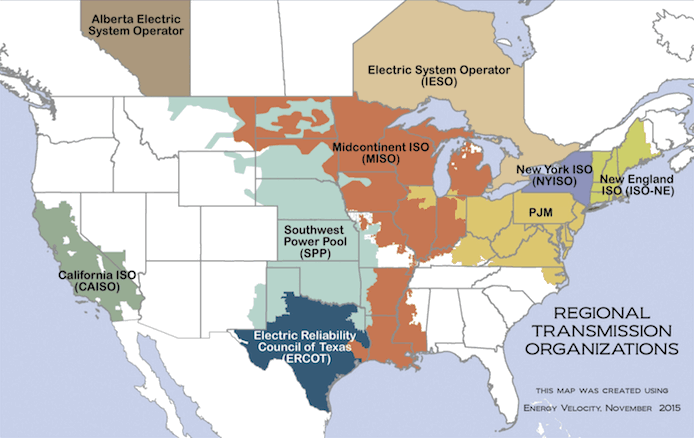RTOs and wholesale markets
An RTO is an independent, non-profit organization that operates the high-voltage transmission lines of a group of utilities over a large region. An RTO also operates a competitive wholesale electricity market where electricity producers bid into the market and the lowest bids are chosen to dispatch their electricity to consumers. Electricity trading over large regions is more efficient and cost-effective, and also allows greater integration of variable renewable energy and reduces curtailment (waste) caused by local oversupply.
Colorado does not currently belong to an RTO, but a group of Colorado utilities called the Mountain West Transmission Group (MWTG) is proposing to join the Southwest Power Pool (SPP), which is the RTO to our east. Hearings on the proposal (Docket no. 16I-0816E) are on-going at the Colorado Public Utilities Commission (PUC). However, there is also an expanding Western RTO called CAISO, as well as one or more new RTO possibilities that may or may not be a better choice for Colorado and the Western Interconnection.
Additional information
- The U.S. electricity system – Our primer on RTOs and how they work.
- Article (Utility Dive) – Why regional wholesale electricity markets are needed in the West.
- Article (Denver Post) – Detail about the Mountain West proposal to join SPP.
- Podcast (Grid Geeks) – Status of grid regionalization and wholesale electricity markets in the West.
- White paper (Johnson, Hewlett Foundation) – "Grid Integration in the West: Bulk Electric System Reliability, Clean Energy Integration, and Economic Efficiency". Excellent overview of Western grid regionalization.
- PUC comment (Energy Freedom Colorado) – Our comments to the Colorado PUC about the MWTG proposal to join SPP. It concerns alternatives to SPP and recommends investigating all the available market/RTO options to ensure that the best choice for Colorado and the rest of the Western Interconnection is chosen.
- Op-Ed (Boulder Daily Camera) – Overview of RTOs, the relationship between wholesale and retail competitive markets, and the case to explore alternatives to joining SPP.
